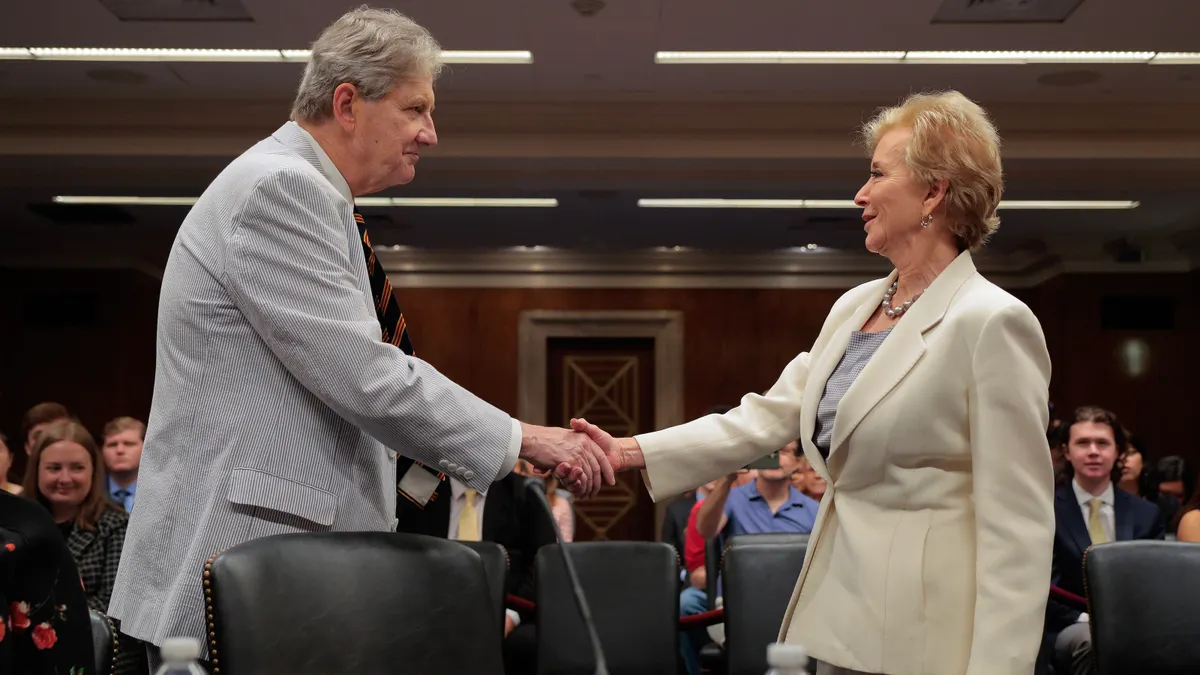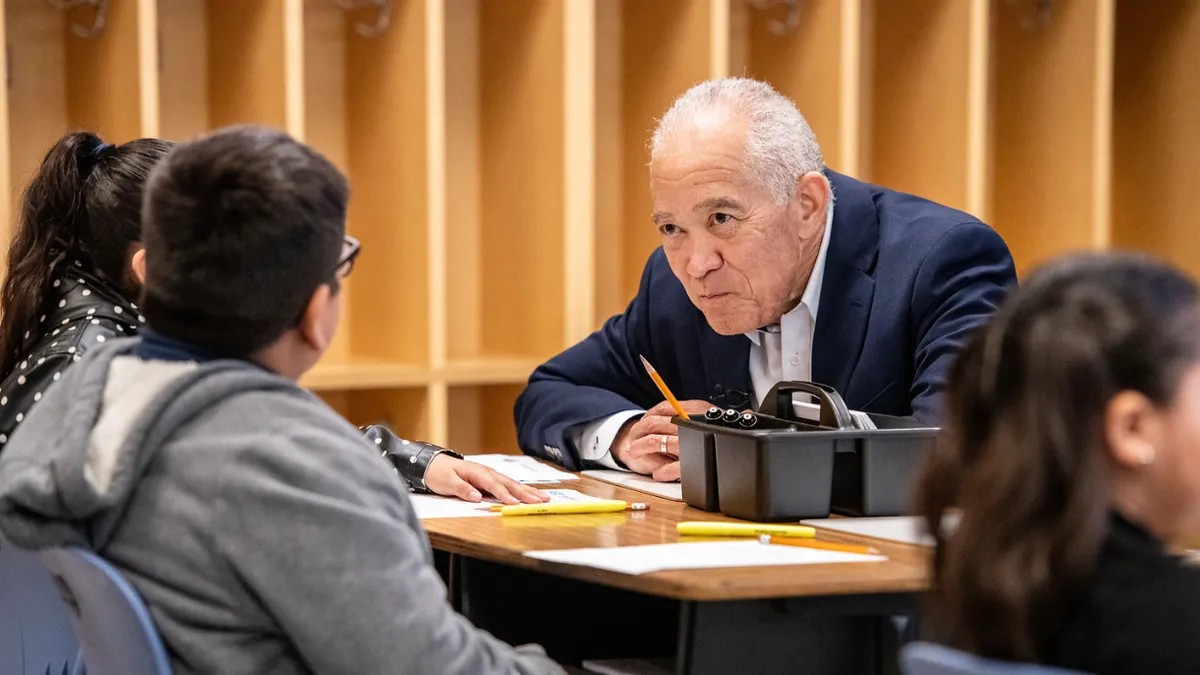WASHINGTON — A confident U.S. Education Secretary Linda McMahon told a panel of senators Tuesday how the U.S. Department of Education's fiscal year 2026 budget proposal aims to reduce federal bureaucracy and empower state-level decision making. Several senators on both sides of the aisle, however, questioned the depth of some of the proposed cuts to K-12 and reasoning behind the financial reforms.
McMahon fielded inquiries from a Senate appropriations subcommittee during the 1 ½-hour hearing on the Trump administration’s FY 2026 budget recommendations, including about funding for the Office for Civil Rights, mental health, literacy and college access.
The budget recommends a total of $66.7 billion for all Education Department activities, which would be $12 billion, or 15.3% less than its current funding level. For the K-12 portion, the goal is a $4.5 billion cut.
McMahon and President Donald Trump have set a goal for the "responsible" closure of the Education Department.
Sen. Shelley Moore Capito, R-W.Va., chair of the Senate Appropriations Subcommittee on Labor, Health and Human Services, Education and Related Agencies, and Sen. Katie Britt, R-Ala., asked McMahon how the proposed budget will improve literacy performance, which McMahon said is her No. 1 priority.
"There have been a lot of programs that have been tried to make sure that we could help students read, and they've not worked," said McMahon, adding that states like Mississippi, Louisiana and Iowa that are using science of reading approaches are seeing reading gains.
But several Democratic senators were doubtful of the proposed efforts to improve literacy since the FY 26 plan moves the competitive literacy state development grant program to a new K-12 Simplified Funding Program. That block grant would include 17 other current competitive grants and states would be required to spend at least 7.5% of their consolidated K-12-SFP funds on literacy instruction supported by "high or moderate evidence."
Sen. Jack Reed, D-R.I., questioned how the Education Department plans to make literacy and other improvements with a $4.5 billion cut to K-12.
"We have this crisis, education and literacy, all these factors," Reed said. "What we're going to do is pull back what the states are doing," referring to the proposed cuts.
McMahon replied, "No, we'll spend it more responsibly."
Reed said he was doubtful about that. But Capito, earlier in the hearing, said, "We know that throwing more money at the problem will not lead to a solution" to improve academic performances.
The cancellation of about $1 billion in multi-year school-based mental health grants that were previously awarded to support students' well-being prompted a round of questions from Sen. Tammy Baldwin, D-Wis., ranking member of the subcommittee, and Sen. Chris Murphy, D-Conn.
"It's extraordinary because you didn't cut off new grants. You cut off existing grants," Murphy said to McMahon. "So in states all across the nation, blue and red, there are now mental health programs for kids that are shutting down."
Murphy added, "Do you worry about what's going to happen to those kids in Northwest Connecticut and kids all across the country who have lost access to their trusted adult?"
McMahon said the grants were not canceled, but recipients will need to submit new applications for the competitive awards. The restructuring will give districts and states more authority on how to use the funds, she said.
"As we look at mental health grants across the country, we have to make sure that those programs are being used to serve best in those communities, so therefore a governor or a principal or state superintendent would have the best information relative to what is needed in that particular state," McMahon said.
Several Republican and Democratic senators pleaded with McMahon to rethink a proposal to zero out $1.2 billion in federal TRIO programs that provide outreach and support for students from disadvantaged backgrounds in their academic paths from middle school through post baccalaureate programs.
"I have seen the lives of countless first-generation and low-income students — not only in Maine, but across the country — who will often face barriers to accessing a college education, changed by the TRIO program," said Sen. Susan Collins, R-Maine, chair of the full Senate Appropriations Committee.
McMahon said the Education Department's inability to measure the effectiveness of TRIO and the program's administrative burdens led to the program being recommended for elimination.
"I do know, however, that Congress does control the purse strings, and I would sincerely hope that if you decide with appropriations to continue these programs, that we could work with you to renegotiate those terms that we feel kind of hamstrung the Department of Education" regarding accountability for the program, McMahon said.
Office for Civil Rights and FY 25 spending
Several senators questioned McMahon about the enforcement of civil rights in schools, especially as the Education Department, since January, fired or accepted "buyouts" from about half its staff. Even before the staff reductions and the shuttering of over half of OCR offices, several civil rights advocates said OCR was understaffed.
The FY 26 budget proposal recommends reducing OCR's budget from $140 million to $91 million.
Sen. Patty Murray, D-Wash., vice chair of the full Senate Appropriations Committee, questioned McMahon about OCR's capacity to address complaints now that it has a reduced workforce.
McMahon said that when the Trump administration began, there was a backlog of 20,000 cases, and now there are 2,500. The Education Department clarified after the hearing that OCR, under the second Trump administration, has resolved more than 2,600 cases.
"If you don't have a staff, you can't do it," Murray said.
"If you have an efficient staff that has changed programs and you are addressing all the issues, then you are being successful," McMahon replied.
In the exchange between Murray and McMahon, the senator asked about the justification for the workforce reductions across the agency and if it had studied the effects on the education system before the reductions took place.
McMahon said a study hadn't been conducted, but that restructuring staff can be "painful."
Murray and Baldwin also probed McMahon about what they said is a lack of transparency and delays with distributing this year's funding to states and districts.
The federal government is technically operating on the approved FY 2024 budget because an extension of the FY 2024 budget, or continuing resolution for FY 2025, runs through Sept. 30. The 2026 fiscal year starts on Oct. 1.
McMahon said the Education Department is analyzing the unallocated dollars to determine which programs to fund.
But Murray said she was concerned, because the agency is "running out of time" to distribute the money.
"Those funds were appropriated by Congress, your department was to allocate them, and it really looks to me like the department is illegally impounding funding that would help our students succeed."
Editor’s Note: This article has been updated to reflect the number of resolved OCR cases, per a clarification from the Education Department after the hearing.




















